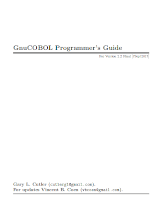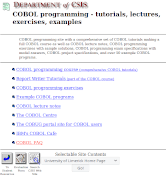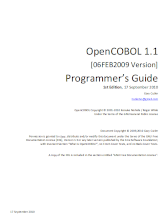Last Updated on April 4, 2025
COBOL is an acronym which stands for Common Business-Oriented Language. The US Department of Defense, in a conference, formed CODASYL (Conference on Data Systems Language) to develop a language for meeting business data processing needs which is now known as COBOL.
COBOL is a standard language that can be compiled and executed on various machines. It’s ideally suited for business-oriented applications as it can handle huge volumes of data. It provides numerous debugging and testing tools. COBOL is a structured language; it has different divisions, so it’s easy to debug. The language is not designed for writing systems programs.
COBOL is one of the oldest computer languages.
1. GnuCOBOL Programmer’s Guide by Gary Cutler
 GnuCOBOL Programmer’s Guide describes the syntax,semantics and usage of the COBOL programming language as implemented by the current version of GnuCOBOL, formerly known as OpenCOBOL.
GnuCOBOL Programmer’s Guide describes the syntax,semantics and usage of the COBOL programming language as implemented by the current version of GnuCOBOL, formerly known as OpenCOBOL.
This document was intended to serve as a full-function reference and user’s guide suitable for both those readers learning COBOL for the first time as well as those already familiar with some dialect of the COBOL language.
Permission is granted to copy, distribute and/or modify the GnuCOBOL Programmer’s Guide under the terms of the GNU Free Documentation License, Version 1.3 or any later version published by the Free Software Foundation
2. COBOL programming – tutorials, lectures, exercises, examples by Department of CSIS
 This isn’t a book per se. But it’s a a comprehensive set of COBOL tutorials making a full COBOL course as well as COBOL lecture notes, COBOL programming exercises with sample solutions, COBOL programming exam specifications with model answers, COBOL project specifications, and over 50 example COBOL programs.
This isn’t a book per se. But it’s a a comprehensive set of COBOL tutorials making a full COBOL course as well as COBOL lecture notes, COBOL programming exercises with sample solutions, COBOL programming exam specifications with model answers, COBOL project specifications, and over 50 example COBOL programs.
3. OpenCOBOL 1.1 Programmer’s Guide by Gary Cutler
 This document describes the syntax, semantics and usage of the COBOL programming language as implemented by the current version of OpenCOBOL.
This document describes the syntax, semantics and usage of the COBOL programming language as implemented by the current version of OpenCOBOL.
OpenCOBOL is an open-source COBOL compiler and runtime environment. The OpenCOBOL compiler generates C code which is automatically compiled and linked. While originally developed for UNIX operating systems, OpenCOBOL can also be built for MacOS computers or Windows computers utilizing the UNIX-emulation features of such tools as Cygwin and MinGW. It has also been built as a truly native Windows application utilizing Microsoft’s freely-downloadable Visual Studio Express package to provide the C compiler and linker/loader.
Permission is granted to copy, distribute and/or modify OpenCOBOL 1.1 Programmer’s Guide under the terms of the GNU Free Documentation License[FDL], Version 1.3 or any later version.
All books in this series:
| Free Programming Books | |
|---|---|
| Ada | ALGOL-like programming language, extended from Pascal and other languages |
| Agda | Dependently typed functional language based on intuitionistic Type Theory |
| Arduino | Inexpensive, flexible, open source microcontroller platform |
| Assembly | As close to writing machine code without writing in pure hexadecimal |
| Awk | Versatile language designed for pattern scanning and processing language |
| Bash | Shell and command language; popular both as a shell and a scripting language |
| BASIC | Beginner’s All-purpose Symbolic Instruction Code |
| C | General-purpose, procedural, portable, high-level language |
| C++ | General-purpose, portable, free-form, multi-paradigm language |
| C# | Combines the power and flexibility of C++ with the simplicity of Visual Basic |
| Clojure | Dialect of the Lisp programming language |
| ClojureScript | Compiler for Clojure that targets JavaScript |
| COBOL | Common Business-Oriented Language |
| CoffeeScript | Transcompiles into JavaScript inspired by Ruby, Python and Haskell |
| Coq | Dependently typed language similar to Agda, Idris, F* and others |
| Crystal | General-purpose, concurrent, multi-paradigm, object-oriented language |
| CSS | CSS (Cascading Style Sheets) specifies a web page’s appearance |
| D | General-purpose systems programming language with a C-like syntax |
| Dart | Client-optimized language for fast apps on multiple platforms |
| Dylan | Multi-paradigm language supporting functional and object-oriented coding |
| ECMAScript | Best known as the language embedded in web browsers |
| Eiffel | Object-oriented language designed by Bertrand Meyer |
| Elixir | Relatively new functional language running on the Erlang virtual machine |
| Erlang | General-purpose, concurrent, declarative, functional language |
| F# | Uses functional, imperative, and object-oriented programming methods |
| Factor | Dynamic stack-based programming language |
| Forth | Imperative stack-based programming language |
| Fortran | The first high-level language, using the first compiler |
| Go | Compiled, statically typed programming language |
| Groovy | Powerful, optionally typed and dynamic language |
| Haskell | Standardized, general-purpose, polymorphically, statically typed language |
| HTML | HyperText Markup Language |
| Icon | Wide variety of features for processing and presenting symbolic data |
| J | Array programming language based primarily on APL |
| Java | General-purpose, concurrent, class-based, object-oriented, high-level language |
| JavaScript | Interpreted, prototype-based, scripting language |
| Julia | High-level, high-performance language for technical computing |
| Kotlin | More modern version of Java |
| LabVIEW | Designed to enable domain experts to build power systems quickly |
| LaTeX | Professional document preparation system and document markup language |
| Lisp | Unique features - excellent to study programming constructs |
| Logo | Dialect of Lisp that features interactivity, modularity, extensibility |
| Lua | Designed as an embeddable scripting language |
| Markdown | Plain text formatting syntax designed to be easy-to-read and easy-to-write |
| Objective-C | Object-oriented language that adds Smalltalk-style messaging to C |
| OCaml | The main implementation of the Caml language |
| Pascal | Imperative and procedural language designed in the late 1960s |
| Perl | High-level, general-purpose, interpreted, scripting, dynamic language |
| PHP | PHP has been at the helm of the web for many years |
| PostScript | Interpreted, stack-based and Turing complete language |
| Prolog | A general purpose, declarative, logic programming language |
| PureScript | Small strongly, statically typed language compiling to JavaScript |
| Python | General-purpose, structured, powerful language |
| QML | Hierarchical declarative language for user interface layout - JSON-like syntax |
| R | De facto standard among statisticians and data analysts |
| Racket | General-purpose, object-oriented, multi-paradigm, functional language |
| Raku | Member of the Perl family of programming languages |
| Ruby | General purpose, scripting, structured, flexible, fully object-oriented language |
| Rust | Ideal for systems, embedded, and other performance critical code |
| Scala | Modern, object-functional, multi-paradigm, Java-based language |
| Scheme | A general-purpose, functional language descended from Lisp and Algol |
| Scratch | Visual programming language designed for 8-16 year-old children |
| SQL | Access and manipulate data held in a relational database management system |
| Standard ML | General-purpose functional language characterized as "Lisp with types" |
| Swift | Powerful and intuitive general-purpose programming language |
| Tcl | Dynamic language based on concepts of Lisp, C, and Unix shells |
| TeX | Markup and programming language - create professional quality typeset text |
| TypeScript | Strict syntactical superset of JavaScript adding optional static typing |
| Vala | Object-oriented language, syntactically similar to C# |
| VHDL | Hardware description language used in electronic design automation |
| VimL | Powerful scripting language of the Vim editor |
| XML | Rules for defining semantic tags describing structure ad meaning |
